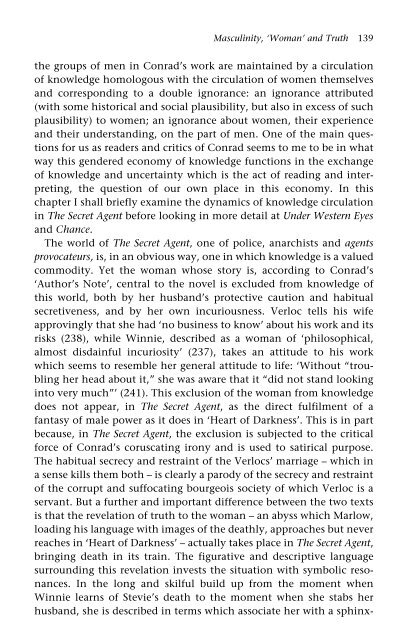Conrad and Masculinity
Conrad and Masculinity
Conrad and Masculinity
You also want an ePaper? Increase the reach of your titles
YUMPU automatically turns print PDFs into web optimized ePapers that Google loves.
<strong>Masculinity</strong>, ‘Woman’ <strong>and</strong> Truth 139<br />
the groups of men in <strong>Conrad</strong>’s work are maintained by a circulation<br />
of knowledge homologous with the circulation of women themselves<br />
<strong>and</strong> corresponding to a double ignorance: an ignorance attributed<br />
(with some historical <strong>and</strong> social plausibility, but also in excess of such<br />
plausibility) to women; an ignorance about women, their experience<br />
<strong>and</strong> their underst<strong>and</strong>ing, on the part of men. One of the main questions<br />
for us as readers <strong>and</strong> critics of <strong>Conrad</strong> seems to me to be in what<br />
way this gendered economy of knowledge functions in the exchange<br />
of knowledge <strong>and</strong> uncertainty which is the act of reading <strong>and</strong> interpreting,<br />
the question of our own place in this economy. In this<br />
chapter I shall briefly examine the dynamics of knowledge circulation<br />
in The Secret Agent before looking in more detail at Under Western Eyes<br />
<strong>and</strong> Chance.<br />
The world of The Secret Agent, one of police, anarchists <strong>and</strong> agents<br />
provocateurs, is, in an obvious way, one in which knowledge is a valued<br />
commodity. Yet the woman whose story is, according to <strong>Conrad</strong>’s<br />
‘Author’s Note’, central to the novel is excluded from knowledge of<br />
this world, both by her husb<strong>and</strong>’s protective caution <strong>and</strong> habitual<br />
secretiveness, <strong>and</strong> by her own incuriousness. Verloc tells his wife<br />
approvingly that she had ‘no business to know’ about his work <strong>and</strong> its<br />
risks (238), while Winnie, described as a woman of ‘philosophical,<br />
almost disdainful incuriosity’ (237), takes an attitude to his work<br />
which seems to resemble her general attitude to life: ‘Without “troubling<br />
her head about it,” she was aware that it “did not st<strong>and</strong> looking<br />
into very much”’ (241). This exclusion of the woman from knowledge<br />
does not appear, in The Secret Agent, as the direct fulfilment of a<br />
fantasy of male power as it does in ‘Heart of Darkness’. This is in part<br />
because, in The Secret Agent, the exclusion is subjected to the critical<br />
force of <strong>Conrad</strong>’s coruscating irony <strong>and</strong> is used to satirical purpose.<br />
The habitual secrecy <strong>and</strong> restraint of the Verlocs’ marriage – which in<br />
a sense kills them both – is clearly a parody of the secrecy <strong>and</strong> restraint<br />
of the corrupt <strong>and</strong> suffocating bourgeois society of which Verloc is a<br />
servant. But a further <strong>and</strong> important difference between the two texts<br />
is that the revelation of truth to the woman – an abyss which Marlow,<br />
loading his language with images of the deathly, approaches but never<br />
reaches in ‘Heart of Darkness’ – actually takes place in The Secret Agent,<br />
bringing death in its train. The figurative <strong>and</strong> descriptive language<br />
surrounding this revelation invests the situation with symbolic resonances.<br />
In the long <strong>and</strong> skilful build up from the moment when<br />
Winnie learns of Stevie’s death to the moment when she stabs her<br />
husb<strong>and</strong>, she is described in terms which associate her with a sphinx-




